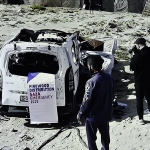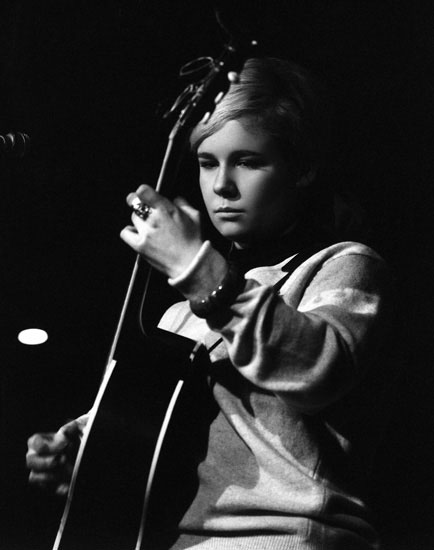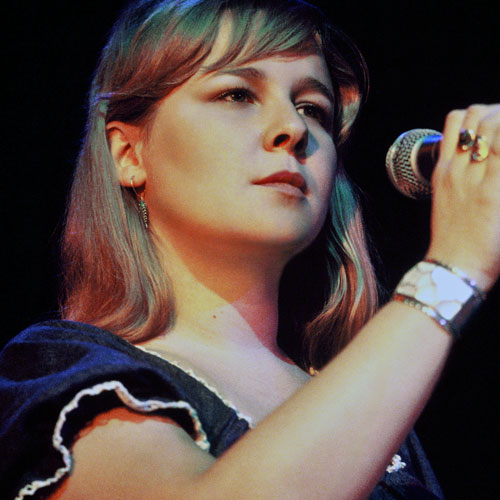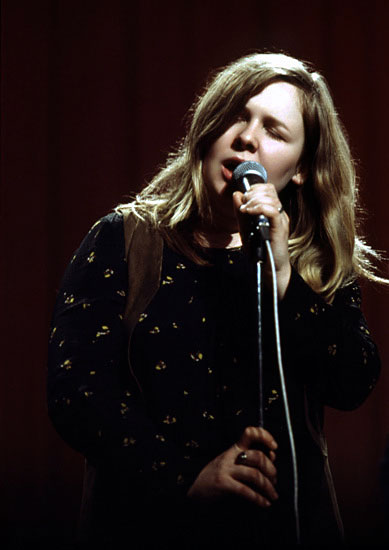Sandy Denny Remembered
Photo: Jon Lyons
Biography
Sandy Denny (6 January 1947 – 21 April 1978), born Alexandra Elene Maclean Denny, was an English singer and songwriter, perhaps best known as the lead singer for the folk rock band Fairport Convention. She has been described by Allmusic’s Richie Unterberger as “the pre-eminent British folk rock singer”. After briefly working with British folk band the Strawbs, Denny joined Fairport Convention in 1968, remaining with that band until the end of 1969. She formed the short-lived band Fotheringay in 1970, releasing one album with them (another unreleased album would surface some three decades later), before focusing on a solo career. Between 1971 and 1977, Denny released four solo albums: The North Star Grassman and the Ravens, Sandy, Like an Old Fashioned Waltz, and Rendezvous. She is also noted as the only guest vocalist on a Led Zeppelin studio album, when she shared a duet with Robert Plant for “The Battle of Evermore” on Led Zeppelin IV (1971).
Music publications Sunday Express, Uncut and Mojo have each called Denny Britain’s finest female singer-songwriter. Her composition “Who Knows Where the Time Goes?” has been recorded by many artists as diverse as Judy Collins, Nina Simone and Cat Power.
Her earliest professional recordings were made a few months later in mid-1967 for the Saga Records label, featuring traditional songs and covers of folk contemporaries including her boyfriend of this period, the American singer-songwriter Jackson C. Frank. They were released on the albums Alex Campbell and his Friends and Sandy and Johnny with Johnny Silvo. These songs were collected on the 1970 album It’s Sandy Denny where the tracks from Sandy and Johnny had been re-recorded with more accomplished vocals and guitar playing.[6] The complete Saga studio recordings were issued on the 2005 compilation Where The Time Goes.
By this time she had abandoned her studies at art college and was devoting herself full-time to music. While she was performing at The Troubadour folk club, a member of the Strawbs heard her, and in 1967, she was invited to join the band. She recorded one album with them in Denmark which belatedly came out in 1973 as Sandy Denny and the Strawbs All Our Own Work. The album includes an early solo version of her best-known (and widely recorded) composition, “Who Knows Where the Time Goes”. A tape of that solo version found its way into the hands of American singer Judy Collins, who chose to cover it as the title track of an album of her own, released in November 1968, thus giving Denny international exposure as a songwriter before she had become widely known as a singer.
Photo: Ray Stevenson
Fairport Convention conducted auditions in May 1968 for a replacement singer following the departure of Judy Dyble after their debut album, and Denny became the obvious choice. According to group member Simon Nicol, her evident personality and musicianship made her stand out from the other auditionees “like a clean glass in a sink full of dirty dishes”. Beginning with What We Did On Our Holidays, the first of three albums she made with the band in the late sixties, Denny is credited with encouraging Fairport Convention to explore the traditional British folk repertoire, and is thus regarded as a key figure in the development of British folk rock. She brought with her the traditional repertoire she had refined in the clubs, including “A Sailor’s Life” featured on their second album together Unhalfbricking. Framing Denny’s performance of this song with their own electric improvisations, her bandmates discovered what then proved to be the inspiration for an entire album, the influential Liege & Lief (1969).
Denny left Fairport Convention in 1969 to develop her own songwriting more fully. To this end, she formed her own band, Fotheringay, which included her boyfriend, Trevor Lucas formerly of the group Eclection. They created one self-titled album (a second left unfinished in 1970 was finally released in 2008) which included an eight-minute version of the traditional “Banks of the Nile”, and several Denny originals, among them “The Sea” and “Nothing More” (the latter marked her first composition on the piano, which was to take over as her primary instrument from then on). The group dissolved when producer Joe Boyd left to take up a job at Warner Brothers in California.
She then turned to recording her first solo album The North Star Grassman and the Ravens. Released in 1971, it is distinguished by its elusive lyrics and unconventional harmonies. Highlights included “Late November”, inspired by a dream and the death of Fairport band member Martin Lamble, and “Next Time Around” a cryptogram about Jackson C. Frank, one of her many portraits in song.
Sandy with a cover photograph by David Bailey followed in 1972 and was the first of her albums to be produced by Trevor Lucas. As well as introducing eight new original compositions, the album also marked her last recording of a traditional song, “The Quiet Joys of Brotherhood” (words by Richard Fariña), with Denny’s ambitious multi-tracked vocal arrangement inspired by the Ensemble of the Bulgarian Republic.
Melody Maker readers twice voted her the “Best British Female Singer” in 1970 and 1971 and, together with contemporaries including Richard Thompson and Ashley Hutchings, she participated in a one-off project called The Bunch to record a collection of rock and roll era standards released under the title of Rock On. During this period, Denny also appeared in a brief cameo on Lou Reizner’s version of The Who’s rock opera, Tommy, and duetted with Robert Plant on “The Battle of Evermore” from Led Zeppelin’s 1971 album (Led Zeppelin IV), becoming the only guest vocalist ever to appear on a Led Zeppelin album.
In 1973, she married long term boyfriend and producer Trevor Lucas and recorded a third solo album, Like An Old Fashioned Waltz. The songs continued to detail many of her personal preoccupations: loss, loneliness, fear of the dark, the passing of time and the changing seasons. The album contained one of her best loved compositions, “Solo”, and featured a cover image by Gered Mankowitz.
In 1974, she returned to Fairport Convention (of which her husband was by then a member) for a world tour (captured on the 1974 album Fairport Live Convention) and a studio album, Rising for the Moon in 1975. Although her development as a soloist and songwriter had taken her further away from the folk roots direction that the band had pursued since Liege & Lief, seven of the eleven tracks on Rising for the Moon were either written or co-written by her.
Denny and Lucas left Fairport Convention at the end of 1975 and embarked on what was to become her final album Rendezvous. Released in 1977, the album is now generally thought to be overproduced despite containing some of her finest compositions such as “I’m A Dreamer”, “One Way Donkey Ride” and the classically-influenced “All Our Days”. Having relocated to the village of Byfield in Northamptonshire in the mid-seventies, Denny gave birth to her only child, a daughter named Georgia in July 1977.
Photo: Jan Persson
A UK tour to promote Rendezvous in the autumn of 1977 marked her final public appearances. The closing night at the Royalty Theatre in London on 27 November 1977 was recorded for a live album, Gold Dust, which, because of technical problems in the recording of the electric guitar, was belatedly released in 1998 after most of the guitars had been re-recorded by Jerry Donahue.
By 1977 Denny’s substance abuse issues had worsened. During her pregnancy, she drank and took cocaine. Linda Thompson told The Guardian that shortly after Georgia’s birth, Denny “was crashing the car and leaving the baby in the pub and all sorts of stuff.” Thompson also noted that the child was premature, yet Denny seemed to have little concern for her new baby.
In March 1978, while on holiday with her parents and baby in Cornwall, Denny was injured when she fell down a staircase and hit her head on concrete. Following the incident, Denny suffered from intense headaches; a doctor prescribed her the painkiller Distalgesic, a drug known to have fatal side effects when mixed with alcohol. Denny was able to perform one last concert several days after the fall. Concerned with his wife’s erratic behaviour and fearing for his daughter’s safety, Denny’s husband Trevor Lucas fled the UK back to his native Australia with their child several weeks after the accident.
On 17 April Denny collapsed and fell into a coma while at friend Miranda Ward’s home. Four days later, she died at Atkinson Morley Hospital in Wimbledon. Her death was ruled to be the result of a traumatic mid-brain haemorrhage and blunt force trauma to her head. The funeral took place on 27 April 1978 at Putney Vale Cemetery. After the vicar had read Denny’s favourite psalm - Psalm 23 (The Lord is my Shepherd) - a piper played “The Flowers of the Forest”, a traditional song commemorating the fallen of Flodden Field. The inscription on her headstone reads, “‘The Lady’” Alexandra Elene MacLean Lucas (Sandy Denny) 6.1.47 - 21.4.78.”
|
|

|

The Airborne Toxic Event |
LATEST GALLERY IMAGES

Charity Workers Massacred 
We Bombed A Hospital |
|
|





